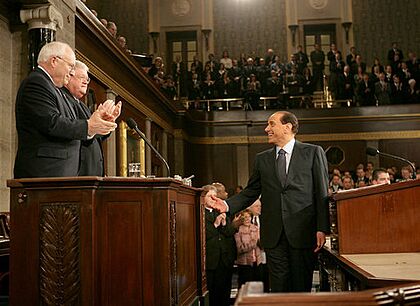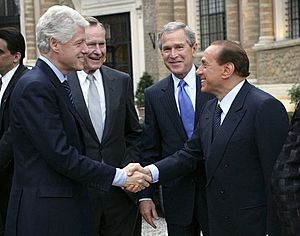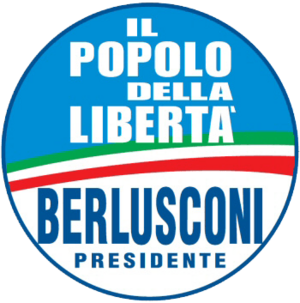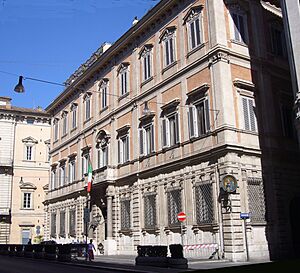Political career of Silvio Berlusconi facts for kids

Silvio Berlusconi was an important Italian politician who served as Prime Minister of Italy several times. His political journey began in 1994. He led the country from 1994 to 1995, again from 2001 to 2006, and finally from 2008 to 2011. He was known for creating his own political party, Forza Italia, and for his strong presence in Italian politics for many years.
Contents
- Political Career Highlights
- See also
Political Career Highlights
In the early 1990s, many of Italy's main political parties faced problems. People were losing trust in them because of investigations into financial issues. This made many people think that new parties would win the next elections.
On January 26, 1994, Berlusconi decided to enter politics. He started his own party, Forza Italia. His main goal was to protect Italy from what he called "the Communists." He wanted to show voters that his party was new and fresh, but would also continue Italy's pro-Western, free-market policies, which had been in place since the end of World War II.
1994 General Election
To win the March 1994 election, Berlusconi formed two different groups of allies. In northern Italy, his party, Forza Italia, teamed up with the Lega Nord (Northern League). In central and southern Italy, they joined forces with the National Alliance. This was a clever move because the Northern League and the National Alliance did not get along.
Berlusconi used his three TV networks to run a huge advertising campaign. He won the elections, and Forza Italia became the party with the most votes (21%). One big promise he made was to create "one million more jobs." He became prime minister in 1994, but his time in office was short. This was because his allies had very different ideas. The Northern League wanted more power for regions, while the National Alliance was focused on national unity.
Berlusconi's First Government Ends
In December 1994, the leader of the Lega Nord, Umberto Bossi, left Berlusconi's government. He said that the promises made during the election were not being kept. This forced Berlusconi to step down as prime minister.
Berlusconi stayed as prime minister for about a month until a new government was formed. In 1996, Berlusconi and his allies lost the election. A new government, led by Romano Prodi, took over.
2001 General Election
In 2001, Berlusconi ran for prime minister again. He led a group of center-right parties called House of Freedoms. This group included Lega Nord and the National Alliance. Berlusconi won the 2001 election and became Prime Minister once more. His group received a good percentage of the votes.
During the election campaign, Berlusconi made a big promise to the public. He signed a "Contract with the Italians" on TV. In this agreement, he promised to improve Italy's economy and people's lives. He said he would simplify the tax system, cut unemployment in half, and start many new public works projects. He also promised to raise the minimum pension and fight crime by putting more police officers in cities. Berlusconi even said he would not run for re-election in 2006 if he failed to keep at least four of these five promises.
Berlusconi's Second Government
Some people believed Berlusconi did not achieve all the goals he promised in his "Contract with the Italians." Some of his government partners said that unexpected global economic problems made it hard to keep all promises. Berlusconi, however, always said he achieved all his goals. He believed his government created a "continuous miracle" for Italy. He often said that newspapers were against him and did not report his successes fairly. An independent expert, Luca Ricolfi, said that Berlusconi only managed to keep one promise: the one about minimum pension levels.
Local and European Elections
In 2003, Berlusconi's House of Freedoms group did not do as well in local elections. In the 2004 European Parliament election, their support also went down. Because of these results, other parties in Berlusconi's group, who had done better, asked for more say in the government's plans.
Berlusconi's Third Government
In the 2005 regional elections, Berlusconi's group lost control of 12 out of 14 regions. They only kept two regions: Lombardy and Veneto. Because of these losses, three parties threatened to leave Berlusconi's government. After some thought, Berlusconi resigned as prime minister on April 20, 2005. On April 23, he formed a new government with the same allies. He changed some ministers and updated the government's plans. A key change was to focus less on big tax cuts, which some allies wanted.
2006 General Election
A new election law was put in place before the April 2006 election. This law was made by Berlusconi's parties, even though others disagreed. The results of this election were very close. Romano Prodi's center-left group, called The Union, won by a very small margin. They had slightly more votes than Berlusconi's House of Freedoms.
Even though the difference in votes was tiny, the new election law gave the winning group many more seats in the lower house of Parliament. This meant that the same law Berlusconi's group had approved to help them win actually led to their defeat. Prodi was able to form a new government, but his group had many small parties. If even one of these parties stopped supporting Prodi, his government could fall.
Some parties quickly accepted Prodi's victory. But Berlusconi's Forza Italia and the Northern League did not accept the results until May 2, 2006, when Berlusconi finally resigned.
2008 Election Victory and New Party
After the 2006 election, there was talk about combining some of Berlusconi's allied parties into one big party. On December 2, 2006, during a large protest in Rome, Silvio Berlusconi suggested creating a "Freedom Party." He said that all the people at the protest were part of a "people of freedom."
On November 18, 2007, Berlusconi announced that Forza Italia would become part of a new party called The People of Freedom. He made this announcement from the side of a car in a busy square in Milan. Both his supporters and critics called this announcement the "running board revolution."
After Prodi's government suddenly fell in January 2008, a new election was called for April 2008. Berlusconi and other party leaders agreed to form a joint list called The People of Freedom. They allied with the Northern League.
In the April 2008 election, this group won against the center-left group. Berlusconi's group won more seats in both parts of the Italian Parliament. Berlusconi focused on solving problems like the piles of rubbish in Naples and improving Italy's economy. He also promised to fight tax evasion, fix the justice system, and reduce public debt. Berlusconi and his ministers were sworn in on May 8, 2008.
On November 21, 2008, Forza Italia officially ended and became part of The People of Freedom. The new party was officially launched on March 27, 2009.
Party Split and Berlusconi's Fourth Government Ends
Between 2009 and 2010, Gianfranco Fini, a leader from the National Alliance, started to disagree with Berlusconi's leadership. Fini wanted the party to be more organized, while Berlusconi preferred a more flexible "movement-party" style.
On April 22, 2010, the conflict between Fini and Berlusconi became very public. On July 29, 2010, the party said that Fini's ideas were "incompatible" with their goals. Berlusconi asked Fini to step down from his role as President of the Chamber of Deputies. In response, Fini and his supporters formed their own group called Future and Freedom. It became clear that this new group would leave Berlusconi's party. On November 7, Fini asked Berlusconi to resign as prime minister. A few days later, four members of Fini's group who were in the government resigned. On December 14, Fini's group voted against Berlusconi in a vote of confidence, but Berlusconi still won by a very small number of votes.
In May 2011, Berlusconi's party lost badly in local elections, especially in Milan, which was his hometown. To help reorganize the party, Angelino Alfano was chosen as the new national secretary.
Resignation
On October 10, the Chamber of Deputies rejected the government's budget plan. Because of this, Berlusconi called for a vote of confidence on October 14, which he won by a very small margin. More and more members of Parliament started to join the opposition. On November 8, the budget law was approved, but with even fewer votes for Berlusconi. This showed he had lost his majority.
After this vote, Berlusconi announced he would resign once Parliament passed important economic reforms. Many believed his failure to deal with Italy's large debt was a big reason for his decision to leave office. When he resigned, many people celebrated in the streets outside the Quirinal Palace, where he officially stepped down.
The new economic plan included spending cuts and tax increases. Berlusconi's resignation came at a difficult time for Italy's economy. Many people worried that problems with Berlusconi's leadership were making markets nervous about a possible financial crisis in Italy. This could have affected other countries in the Eurozone and the world economy. Some critics also accused Berlusconi of using his power to help his own businesses. Umberto Bossi, a partner in Berlusconi's government, told reporters that they had asked the Prime Minister to step aside.
The Announcement
On November 7, news reports said Berlusconi had denied rumors that he would resign. He wrote on his Facebook page that the rumors were "groundless." But on November 12, 2011, after a final meeting with his government, Berlusconi met Italian president Giorgio Napolitano to officially resign. He announced this to the public on one of his TV channels. The Italian news agency ANSA reported that Berlusconi said, "This is something that deeply saddens me." Berlusconi admitted he had lost his majority in Parliament. He said that "things like who leads or who doesn't lead the government was less important than doing what is right for the country." Berlusconi also stated that he would not run for office in Italy again.
See also
 | Bessie Coleman |
 | Spann Watson |
 | Jill E. Brown |
 | Sherman W. White |




